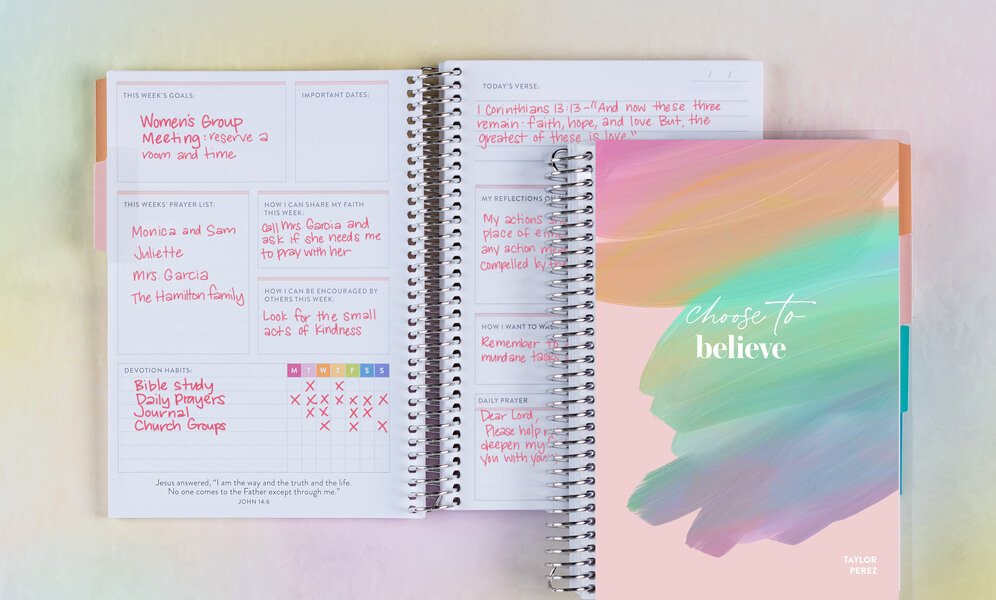Exploring Faith Through Journaling: How to Start a Faith Journal

Finding moments to connect with God, your faith, or your spirituality and deepen your connection can be a challenge. However, one powerful tool that can help you embark on this spiritual journey is a faith or prayer journal. A faith journal is a personal space where you can reflect on your beliefs, prayers, spiritual questions, and experiences. In this article, we will explore the concept of faith journaling, and its benefits, and provide you with a step-by-step guide on how to start your own faith journaling practice. Whether you are new to journaling or have been doing it for years, this guide will help you dive deeper into your faith and build a stronger connection with God.
Being mindful that God has different names and meanings for different people, when we reference God in this article, we’re referring to what that means to you in your personal spiritual journey.
What Is a Faith Journal?
A faith or prayer journal is a personal diary or notebook in which you can record your thoughts, prayers, reflections, and experiences related to your faith. Unlike a typical journal, a faith journal is dedicated specifically to matters of faith, allowing you to explore and strengthen your spiritual connection. It can take various forms, from traditional written text to digital ones, depending on your preferences and lifestyle.
Why Keep a Faith Journal?
Deepen Your Connection
A faith journal can be a potent tool for deepening your connection with God. It provides a safe and personal space for you to explore your beliefs and engage in meaningful conversations with God or prayer.
Reflection and Self-Discovery
Writing in your faith journal gives you quiet time to reflect on your spiritual journey. It helps you gain insight into your beliefs, values, and the impact of faith on your life.
Stress Reduction
Journaling is known to reduce stress and anxiety. When you incorporate faith-based elements into your journaling practice, you can find solace and peace in times of difficulty.
Prayer and Gratitude
Faith journaling can serve as a platform for writing down your prayers, expressing gratitude, and seeking guidance. It's a tangible way to communicate the love you have for your faith.
Accountability
Keeping a faith journal can help you stay accountable to your spiritual goals and practices. It allows you to track your progress and see where you need to grow.
How to Start Faith Journaling
Starting a faith journal is a simple and personal process. Here's a step-by-step guide to help you get started:
Choosing a Faith Journal
The first step in starting a faith journal is to choose the journal itself. You can opt for a traditional physical journal or explore digital options if that suits your lifestyle better. When selecting a prompted journal, consider factors such as size, paper quality, and aesthetics. Your journal should feel inviting and inspire you to write regularly.
If you prefer a digital faith journal, you can use a variety of note-taking apps or specialized journaling apps that offer features like password protection, cloud syncing, and customizable templates.
Optional Materials and Supplies
While all you need to start a faith journal is the journal itself, you may want to gather some optional materials and supplies to enhance your experience:
- Pens and Markers: Choose writing tools, including Bible highlighters, that you enjoy using. Different colors and styles can help you express your thoughts and emotions, highlight passages in your book of faith, and color-code your faith journal.
- Stickers and Decorative Elements: Some people enjoy embellishing their journals with stickers, washi tape, or other decorative elements that have spiritual significance.
- Art Supplies: If you're artistically inclined, consider including watercolors, colored pencils, or markers for sketching, drawing, or adding artistic elements to your journal.
- Tabs or Dividers: Organize your journal with tabs or dividers to easily find and revisit specific entries or sections.
- Printed Materials: Include printed copies of scriptures, prayers, or inspirational quotes that resonate with you.
Setting Intentions for Your Faith Journaling Practice
Before you start writing in your faith journal, take a moment to set your intentions. Consider why you want to embark on this journey and what you hope to achieve through faith journaling. Some common intentions include:
- Strengthening your relationship with God.
- Seeking guidance and answers to spiritual questions.
- Expressing gratitude and counting your blessings.
- Finding comfort and solace in times of difficulty.
- Documenting your spiritual life for personal growth.
Having clear intentions will help guide your journaling practice and make it more meaningful.
How to Use a Faith Journal

Now that you have your journal and intentions in place, let's explore how to use a faith journal effectively.
Writing Prayers in Your Journal
One of the most common ways to use a faith journal is by writing down your prayers. This is a deeply personal and intimate way to communicate with your faith. Whether it's a formal prayer or simply a heartfelt conversation, putting your words on paper can be a powerful act of devotion.
Reflecting on Bible Verses or Inspirational Quotes
Many people find inspiration and guidance in spiritual scriptures. You can incorporate Bible verses, passages from your book of faith, or mindfulness and inspirational quotes into your journal. Write down verses that speak to you and reflect on their meanings. Consider how these verses apply to your life and what insights they offer. Joining a study group based on your faith – whether it’s a Bible study group, prayer circle, meditation group, or attending meetups at your local house of worship – can help you on your spiritual journey.
Journaling Your Spiritual Questions and Insights
Your faith journey may involve questions, doubts, and moments of enlightenment. Use your faith journal to document these experiences. When you encounter a spiritual question, write it down, and then explore your thoughts and feelings about it. Record any insights or revelations you receive during your contemplation.
Taking Sermon Notes
If you attend religious services or sermons, use your faith journal to take notes. Record key points from the sermon, your personal takeaways, and how the message resonated with you. This can help reinforce the lessons and guidance you receive during these gatherings.
Faith Journal Ideas and Prompts
If you're looking for ideas and prompts to kickstart your faith journaling practice, here are some suggestions to consider:
Daily Gratitude Entries
Start each journaling session by listing things you're grateful for. Expressing gratitude can help you shift your focus to the positive aspects of your life and cultivate a sense of contentment.
Prayer Requests and Answers
Alongside your personal prayers, dedicate a section of your faith journal to prayer requests. Write down the concerns, wishes, or needs of yourself and others. As you receive answers or witness positive changes, make note of them in your journal. This can serve as a testament to the power of faith.
Scriptures That Speak to You
Regularly select a scripture or verse that resonates with you, and write it in your journal. Reflect on its meaning, and discuss how it relates to your life and spiritual journey.
Personal Moments and Miracles
Document moments in your life that feel miraculous or spiritually significant. These may be personal achievements, moments of clarity, or experiences that reaffirm your faith.
Sketching or Doodling in Your Faith Journal
If you're artistically inclined, consider adding sketches, doodles, or artistic representations of your faith journey. These visual elements can help you express your emotions and experiences in a unique way. You may also want to explore art journal prompts.
Starting a faith journal can be a transformative and rewarding experience. It offers you the opportunity to deepen your connection with God, gain insight into your spirituality, and provide a sense of solace in challenging times. Remember, there are no strict rules when it comes to faith journaling; it's a personal journey tailored to your beliefs and aspirations. So, grab your journal, set your intentions, and begin your faith journaling practice today. Your faith journey awaits, find a faith journal to help you navigate it every step of the way.

Related Journaling Guides
You may also enjoy these other popular tips, tricks, and guides for journaling:
- How to Start Journaling for Beginners
- How to Start Mindfulness Journaling + Why You Should
- Journaling for Mental Health + Where to Start
- 15 Reading and Book Journal Ideas to Inspire Your Inner Bookworm
- 8 Life-Changing Benefits of Journaling Before Bed + How to Start
- 20 New Year Writing Prompts for Goal Setting + Personal Growth